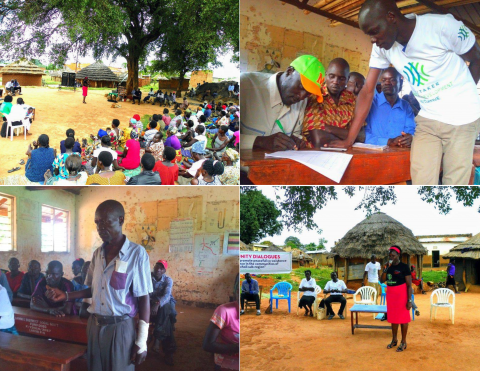Since mid-September, WPDI Youth Peacemakers have held six community dialogues in northern Uganda’s Acholi region. These dialogues gathered a total of 240 local leaders and other stakeholders around a wide-range of issues ranging from land disputes to mass killings. Yet, each issue has one thing in common: they were once thought of as intractable, at least until WPDI’s youths became involved.
The six community dialogues conducted since mid-September were held under our flagship program, the Youth Peacemaker Network (YPN), which aims to empower young women and men from fragile and conflict-afflicted areas with skills that will allow them to become future peacemakers that can make a lasting impact within their communities. Through the program, our expert staff train local youths for one year in a variety of topics relevant to their future work, including peacebuilding, conflict mediation, information and communications technologies, and entrepreneurship. Upon their successful competition of the training, they return to their respective communities to further disseminate what they have learned, therefore creating a grassroots peace force that can amplify the scope of WPDI’s efforts.
Community dialogues are therefore well within the mandate we expect our youths to carry out. In each of the six dialogues recently held in the Acholi sub-region, WPDI youths identified issues of conflict that had pitted communities against each other. Every case had been longstanding, and, in a few instances, other groups had tried previous to serve as mediators – to no avail.
Yet, because our youths knew their communities and were trusted within them, they were able to find success where others had not. For instance, in Katum sub-county, over the years all attempts failed to mediate the resolution to a land dispute between the Pabwodo and Dicpee clans. Since 2015, tensions had ratcheted up between the two, leading to kidnapping, the burning of houses, and the destruction of crops. In response, two of our youths held a community dialogue on September 15th for 260 community members. At that meeting, an immediate ceasefire was agreed upon, as was two additional meetings. Those were successful first steps and a resolution agreement to the land dispute is currently pending.
Another dialogue held between the Pubech and Pajong clans yielded a similar result. On July 24th, 2002, 56 people were killed by the Lord’s Resistance Army in the village of Mucwini. Since then, the village’s two clans have had tense relations with one another; the trauma left in the wake of the attack was never adequately addressed,. In response, three of WPDI’s youths held a community dialogue session for 100 people there, which included local elected leaders. That session resulted in an agreement to unify and, together, create a request for government compensation for victims of the massacre and their families.
Community dialogues such as these are reflective of WPDI’s unique approach: we empower local young people to directly transform their communities in peaceful ways. We are proud of the efforts and successes of our youth peacemakers in northern Uganda – they are truly an inspiration.